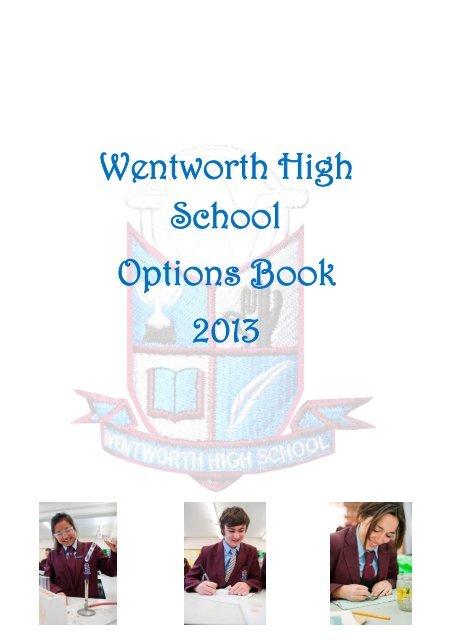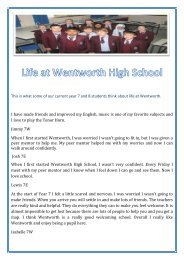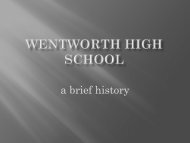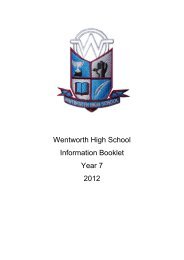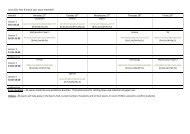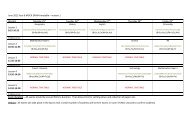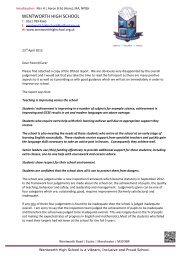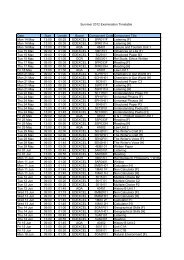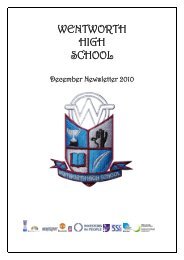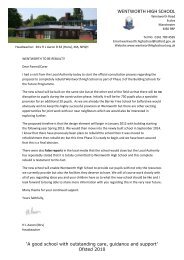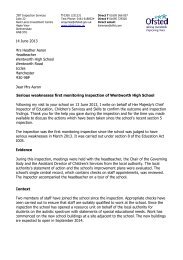Options Booklet 2013 - Wentworth High School
Options Booklet 2013 - Wentworth High School
Options Booklet 2013 - Wentworth High School
Create successful ePaper yourself
Turn your PDF publications into a flip-book with our unique Google optimized e-Paper software.
<strong>Wentworth</strong> <strong>High</strong><strong>School</strong><strong>Options</strong> Book<strong>2013</strong>
Dear Parent/CarerIn Summer Term <strong>2013</strong> your child will begin their final two years of compulsory secondary educationat <strong>Wentworth</strong> <strong>High</strong> <strong>School</strong> when all pupils are required to follow a range of compulsory and optioncourses.Clearly the organisation of next year’s curriculum still requires a great deal of planning by the schoolin order to match the pupils’ choices made with the availability of our teaching staff and ouraccommodation. While every effort is made to achieve this match, there may be occasions when anoption course cannot be offered for a variety of reasons. Unlike many schools, we try to fulfil thepupils’ wishes by offering a free choice in the first instance rather than blocking subjects and makingthem decide on one area in each section. This should result in your child being able to choose thesubjects they really want to study in KS4.Can I also stress that your child is choosing their option subjects not the examination level, decisionsabout this will be made, in consultation with you, at a later date.Please ask your child to return the completed form to their Form Teacher as soon as you havediscussed and completed it with them. The form must be returned by Monday 4 th March <strong>2013</strong>.Should you wish to discuss your child’s choices with a senior member of staff please ring the schooloffice on 0161 789 4565 to make an appointment.H L Aaron (Mrs)Headteacher
Dear Pupil,Up until now the subjects you have followed have been chosen for you. This is nowchanging as you can choose to follow certain subjects at GCSE in Years 10 and 11.Some subjects you select will be ones you have taken before but there is also anopportunity to follow new subjects.This means you will continue to study the core subjects of English, Mathematics andScience. You can then decide the other subjects that will eventually make up your Year 10and 11 curriculum.This booklet is part of the process to help you make sensible and considered decisions.Making your choice is important and you should make the most of the opportunitiesavailable to you in the next few weeks to ensure you make the right decisionsDo……..Remember that all GCSE courses are ofan equal standard;Choose courses you are interested inand which you are likely to enjoy;Choose courses in which you are likelyto achieve success;Choose courses that fit with your futureneeds;Remember that the courses last for twoyears – you will not be able to change yourmind at the end of Year 10!Don’t…….•Choose courses just because your friendshave chosen them;•Decide to take a course just because youlike the teacher you think will be teaching it;•Be afraid to ask for advice or informationfrom your form tutor, subject teachers, yearleader and your family. They want to helpyou make the best choice for you.H L Aaron (Mrs)Headteacher
The CurriculumAll pupils must study English, Maths, Science, ICT and PE. In addition, RE, careers andPSHE/Citizenship are a statutory part of the KS4 curriculum although RE can also be taken as anoption.English BaccalaureateThere are two possible curriculum pathways, both of which are equally valid. Students who followthe English Baccalaureate Pathway must study GCSEs in the following subjects and recognition willonly be awarded at the end of two years if students achieve a Grade C or better in all five areas.EnglishMathsDouble or Triple Science (with C or above in at least 2 of the elements)History or GeographyFrench or SpanishUsing information provided by various sources teachers have been asked to recommend whetherthe English Baccalaureate Pathway is appropriate for your child and this is indicated on the letteryou have with the <strong>Options</strong> <strong>Booklet</strong>. Similarly if your child has not been identified as being in theEnglish Baccalaureate group they are very welcome to choose the English Baccalaureate subjects inthe same way as they would make any option choice. Although the school may recommend theEnglish Baccalaureate Pathway students and/or parents may choose to not to follow this route.
Option SubjectsArt and DesignGCSEThe syllabus itself is a broadly based course covering a numberof aspects of Art and Design. It may include a variety ofDrawing and Painting techniques; Design work in both twoand three dimensions; Sculpture; Fabric and Textile work;Ceramics, (clay); Photography and computer Aided Design andMixed Media work.Candidates will produce a number of pieces throughout thecourse that will be individual in nature or developed inresponse to an externally imposed brief. All candidates willshow, as the course progresses, that they can pursue ideas ina logical and thoughtful manner through a wide variety ofmedia, eventually producing images that are attractive,interesting and satisfying.Throughout the course candidates will be given access to thework of other visual artists, both historical and contemporary,as an integral part of the course.The Fine Art course does require a substantial amount ofcommitment both in and out of school. Work produced athome throughout the two years will be necessary forsuccessful completion of the examination. Regular homeworkis set.Art and Design provides a unique vehicle for communication andself-expression. The Art and Design course seeks to develop inthe fullest way possible the aesthetic and intellectual awarenessof each examination candidate through a wide variety of visualskills.Business StudiesBTECWhy take Business Studies?
Fancy yourself at the head of a successful business? Got somegreat ideas for new products or services? Or maybe you want towork for a large company by working in marketing ormanagement.The BTEC Level 2 First Certificate in Business is a broadly basedcourse covering a number of aspects of business. All the keytopics of starting and running a business are covered.Unit 1 – Enterprise in the Business World allows learners toexplore key introductory business theory whist using their owncreativity and entrepreneurial skills to apply that theory to theirown business idea. The unit content is designed to inform andinspire learners to develop their own realistic business models.Learners will explore what businesses do, trends that affectthem, how they operate and the factors that influence theirsuccess.Unit 2 – Finance for Business prepares learners with theessential financial principles that underpin successful business.The unit introduces learners to types of costs businesses incur,from the initial start-up costs to the ongoing daily expenditure ofrunning a business. Learners will also be introduced to financialplanning tools (budgeting, cash flow forecasting) and how tomeasure the results using financial statements (profit & loss,balance sheet).Unit 3 – Promoting a Brand gives learners an opportunity to findout what it takes to build a brand and what a business has toconsider when planning brand development. Learners willinvestigate the importance of branding to a business, the typesof branding that are available and why businesses need toreview and update their brands. Learners will consider theimportant role of promotion and its place within the marketingmix.Catering (Single Award)GCSEThis course will cover all aspects of the catering industry and itmay also be possible to extend study into the area of corporate
GCSEIt is proven statistically that unemployment rates amongstModern Language Graduates are lower than amongst othergraduates. Also, after recent research, it has been found thatpeople who use languages in their jobs—even at a basic level—earn on average 8 % more.There are many different jobs that need languages,eg ccomputer game designers, accountants, journalists, lawyersand engineers.Learning languages also brings many other benefits includingimproved communication skills, improved listening skills,improved social skills, you become more employable and youare likely to get quicker promotion.Students in high schools are being encouraged to take alanguage for all the reasons above and because many of the redbrick, more prestigious universities are looking to offer places toyoung people who can demonstrate they have studied a broadrange of subjects including a language at GCSE.How does the course work?The GCSE course builds on the work done in Years 7-9 but at abroader and higher level. The language skills of Listening andReading are worth 20% each in the final exam and Writing andSpeaking are worth 30% each. The skill of Writing is assessedthrough written assessments during Years 10 and 11. The skill ofSpeaking is assessed through a number of Speaking assessmentsthroughout the course.All pupils will cover a series of core topics: personal information,future plans education and work, tourist information andcustomer services and transactions. The nicest thing about thecourse is that only 40% is tested formally at the end of year 11and tasks that are taken during the two year course can beretaken and improved upon.
GeographyEnglish Baccalaureate SubjectsGCSEWhy should you study GCSE Geography?There are many reasons - Here are just three quotes:"Geography is the subject which holds the key to ourfuture" - Michael Palin,"Geography prepares for the world of work -geographers, with their skills of analysis are highlyemployable!""Without Geography - You are nowhere!"The study of GCSE Geography can help you to:develop a knowledge and understanding of currentevents from the local area to the global.investigate the earth and its peoples.study the features of the earth - such as mountains,rivers and seas - and how they were formed.develop a range of useful skills such as map reading,data collection, ICT and problem solving.gain an understanding and appreciation of the culturesand backgrounds of people from all over the world.What qualities do I need to study GCSE Geography?You should have a keen interest in the world aroundyou.You should be prepared to work hard and researchtopics by yourself.Where will Geography take me?Well for a start - You will probably visit lots morecountries than your parents and travel to areas of theworld only normally seen on television.Geography could lead you to exciting career prospects -Remember Geography achieves good examinationresults nationally and is one of the most versatilesubjects.Geography is classified as a science subject in manyuniversities when studied at A Level.
Health and Social CareGCSEThe work is focused upon the care sector and would be suitablefor those considering a career in this area. This would includeNurseries, Care Homes and NHS in either a practical capacity oradministration.Unit 1 – Pupils will consider the job roles of care workers in thehealth, social care or early years sectors. They will make acomparison of the different needs of their clients and how thecare giver applies the ‘value of care’. They will consider barriersof accessing the services and the benefits of being able to accessthe services.HistoryEnglish Baccalaureate SubjectsGCSEUnit 2 – Pupils will study personal development through eachlife stage from birth to old age. They will study the effects thatlife events have on development and the services available tohelp deal with these events. This will be tested in the form of anexam.In studying History at GCSE, you will be putting the 20th Centuryunder the microscope and trying to look at questions such as:How did Hitler come to power?What caused the Second World War?Why after years of fighting together against Hitler didthe USA and USSR become enemies in the 1940s and50s?Outline of Year 10International relations 1929 – 1969 – covering the road to WorldWar II, the origins of the Cold War and crisis of the Cold War.Looking at some aspect of the swinging sixtiesOutline of Year 11A study of postwar AmericaHitler’s rise to power
MusicMusic Technology (NCFR)Performing Arts BTEC MusicThe Music option at Key Stage 4 is a development of the workstudied at Key Stage 3 and a stepping stone for further study atAS and A Level. The course aims to develop students’understanding and appreciation of a wide range of musicalgenres and styles and encourages critical and creative thinking. Itallows students with only a basic level of music literacy todevelop the skills needed for the assessments. It is a verypractical course, relaxing and fun, providing students with acomplete contrast to the more academic subjects.provides students the opportunity to gain selfconfidencethrough performing to others.develops team-working skills through performing withothers.extends students' creative skills through composingmusic .encourages the understanding of the importance ofcontinuous evaluation and refinement in any process.provides a solid foundation for progression to musicrelated courses, including A-level Music, and a career inmusic professions.The course is divided into three components – performing,composing and listening. Performing has the largest emphasisand students can perform on any instrument they can playincluding drums and voice. Composing is done through musicsoftware programmes and students can readily hear their owncompositions played back via the computer.These two qualifications are delivered concurrently and studentswill choose which qualification to follow once they have startedthe music option.Performing ArtsBTECLevel 2 First Award in Performing ArtsThis course builds upon experience and knowledge gained fromKey Stage 3 drama lessons and will expand the student’sknowledge of the performing arts.This specification includes several units and offers the studentsthe opportunity to undertake a range of performing artsdisciplines e.g - Acting, lighting design, sound design, set design,props making, mask making, make-up design.There are written assignments/ course work that are undertakenalongside all units and it should also be noted that the majorityof practical course work is group activity.Regular attendance and the ability to work with others areessential.
PhotographyGCSEProduct DesignGCSEReligious Studies: Philosophyand Applied EthicsGCSEThe syllabus itself is a broadly based course covering a numberof aspects of Photography. It will include the making ofpinhole cameras to help pupils to understand the concept ofphotography, all basic black and white darkroom photography,digital photography and Photoshop. Fine art photography andexperimenting will also be taught and developed through sunprints, photograms and the use of liquid light (enabling aphotographic image to be processed onto any surface – glass,metal, wood, ceramics etc.) students will be encouraged towork creatively and develop their own ideas throughexperimenting thus making photography and art form nodifferent than painting a picture.The course has been designed to encourage students to be ableto design and make products with creativity and originality byusing a range of materials and techniques. Through a series ofmini projects, students gain the necessary skills and experienceto broaden their knowledge of materials, design practice andcommunication techniques as well as develop understanding ofwider design issues such as sustainability, and product evolution.The GCSE course gives students the opportunity to explore howscience, poverty, medical ethics and the power of the media areviewed by others. They will study how people with differentreligious and secular beliefs respond to questions such as.Who created the world?Why are we here?Why do bad things happen?Students are encouraged to look at differing views and beliefs,and form their own reasoned opinions about current moral andphilosophical issues.In Year 10 students will complete 2 modules of study:Philosophy 1 (Deity, Religious and Spiritual Experience,End of Life)Ethics 1 (Relationships, Medical Ethics, Poverty andWealth)In Year 11 students will complete 2 modules of study:Philosophy 2 (Good and Evil, Revelation, Science)Ethics 2 (Peace and Justice, Equality, Media)
Extra Curricular ActivityIn addition to the wide range of clubs and activities offered in many subject areas <strong>Wentworth</strong> <strong>High</strong><strong>School</strong> offers the Duke of Edinburgh Bronze Award to Year 10 pupils. It is an Extra Curricularprogramme and will not affect any of your options.The award consists of four elements:A skillA serviceA physical activityAn expeditionThe first 3 elements must be completed over a period of time. Candidates must show continuedcommitment over a period of 13 weeks to 2 of the elements and 26 weeks for the third. They mustspend an hour a week on each activity. Candidates can choose which of the elements they want toextend to 26 weeks. If there is a problem with any of the elements they chose to do they can still becredited with the time as long as they explain in their books the reasons for changing and theycontinue their weekly commitment.The expedition must be done during the spring/summer months; it will follow trails and be on lowlevel terrain. It consists of 2 days of planned walks with an overnight stay on a campsite. Candidateswill plan their own route and meals as they will be responsible for making their own meals. Therewill be a practice expedition then an expedition that is assessed.Why should you consider becoming involved?The award is recognised by employers, it promotes teamwork and will give you credit for many ofthe things you are already doing. Mentoring and reading clubs will count towards the award and anyafter school activities like drama and team sports will also count. All of the elements do not have tobe done within school, if you attend a sports club, so any training courses or are involved with anysupport groups all of these will count towards the award. The expedition is a fun activity, you willlearn map reading, working with others and it will also enable you to work independently. Once youhave completed the Bronze Award you will be able to access the Silver and Gold Award.FinallyPlease do not let your child be influenced by what their friends are choosing. It is vital that they optfor subjects which will lead to success for them. These choices can influence what they can do in thefuture so please discuss this at home before completing the form.


